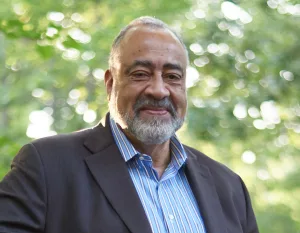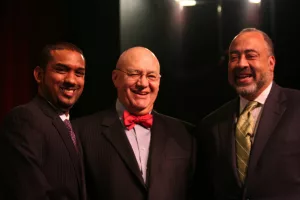
Donald Lewis was dean of Hamline Law from 2008 to 2013.
Donald Lewis, an accomplished attorney who served as dean of Hamline University School of Law from 2008 to 2013, recently retired from the Minneapolis firm he co-founded, Nilan Johnson Lewis. The 70-year-old has shifted to part time arbitration and mediation work with JAMS, a private company that provides alternative dispute resolution services.
Lewis’s tenure at Hamline Law was almost a career midpoint, sandwiched between stints in private practice. While he was serving on the William Mitchell board of trustees in 2007, he became interested in leading an academic environment. A year later, as he prepared to become dean at Hamline Law, the economy collapsed.
At Hamline Law, Lewis succeeded Jon Garon and served as dean for five years. His work changed the face of the school, improving national rankings and placing it in the top five for “best value” in National Jurist magazine. Providing access and helping ensure students were equipped with tools and skills that would help them following law school provoked changes to the curriculum. Some classwork included helping students develop skills to build their own profitable law practices following law school.
“I made it a major focus of my administration of law school to do everything I could to enhance the career opportunities that students would have,” said Lewis.
Strategic planning and creative thinking also led to the very first discussions of what would become the combination of Hamline Law and William Mitchell College of Law. The merger didn’t happen during his tenure, “but it became pretty apparent that was something in our future.
“I wasn’t sure that St. Paul could sustain two law schools or that Minnesota could necessarily sustain four law schools, and I felt that we should explore a path to a combination that ultimately occurred.”
Professor emerita Marie Failinger, who was involved in Lewis’s transition to dean and would later serve as dean herself, said Lewis’ tenure was “probably the most challenging time for admissions in legal education in memory.”
Lewis, Failinger recalled, was “realistic about the need for the law school to ‘right-size,’ and he set about making it happen in a careful way that respected our faculty and staff. But he also brought a new emphasis on courses and opportunities that would prepare students for the practice of law, and improved Hamline’s job placement ranking in the Twin Cities especially.”
Most importantly, Failinger added, Lewis “always acted with integrity and with concern for our faculty, staff, and students.”

Hamline Law Dean Donald Lewis (right), along with Jamal Faleel ’02 and U.S. District Court Judge James Rosenbaum at the Cogito Public Policy Forum, September 2009. (Hamline University photo)
Raised in St. Paul’s historically Black Rondo neighborhood, Lewis was influenced by his father’s civil rights leadership in the NAACP during the civil rights movement. “I grew up with an appreciation of the struggle,” he said.
Even then, he wasn’t thinking about being an attorney. That didn’t happen until he was pursuing a journalism degree at Northwestern University. His initial goal of being a legal affairs reporter slowly morphed into wanting to be a practitioner.
Upon graduating Harvard Law in 1978, Lewis joined the civil rights division of the U.S. Justice Department, where he focused on desegregation in higher education. Some of his cases went before the U.S. Supreme Court. “It was appropriate under constitutional law to mandate remedies for that type of segregated [higher education school] system,” added Lewis.
Lewis then returned to Minnesota in 1982 to be a federal prosecutor. He later joined the now defunct Popham Haik Schnobrich Kaufman and litigated Hollman v. Cisneros and Minneapolis Public Housing Authority in 1995, which resulted in a historic settlement after a finding of racial segregation occurring in public housing.
A year later, Lewis co-founded the firm now known as Nilan Johnson Lewis and focused on both employment litigation and white-collar criminal defense.
After his five years at Hamline Law, Lewis returned to the firm in 2014. Besides his day-to-day cases, he was tasked with several high-profile appointments as an investigative expert for misconduct within organizations. Those cases included being a special prosecutor in the investigation of the police officer who shot and killed Philando Castile at a traffic stop in the Twin Cities in 2016.
His investigations and reviews ranged from looking into academic fraud within the University of Minnesota men’s basketball team and studying ketamine protocols at Hennepin Healthcare to reviewing a fatal landslide at a St. Paul regional park in 2013 and a controversial art installation at the Walker Art Center in 2017.
Lewis notes with pride his time as general counsel to an independent lay task force that reviewed the Archdiocese of St. Paul and Minneapolis’ processes for investigating clergy sexual abuse.
Amongst his various memberships, honors, and board appointments, Lewis helped co-found the Minnesota Association of Black Lawyers in 1995. The work continues, he adds. “There needs to be more progress in terms of retaining and increasing the number of Black associates who are elevated to partnership and shareholder status and leadership roles of firms,” he said.
“We’ve seen some progress on that, but the numbers are still disappointingly small.”
While he’ll continue mediation and arbitration work with JAMS, Lewis says his immediate focus is to spend more time with his grandchildren and to travel with his wife.
As he reflects on his legacy, Lewis hopes he’ll be remembered as someone who showed that “attorneys of color can succeed and be great advocates, practitioners, and more importantly, business developers in that setting.”
But at the same time, he wants to inspire attorneys of all genders and races, saying, “I want people to remember me as someone who was a leading lawyer independent of my race, and someone who likes to practice at the top of their craft.
“I’m a firm believer in Dr. King’s observation that the arc of the universe is long, but it bends towards justice. It’s disappointing that it’s taken so long to improve equity in the profession, but the arc is bending toward more equity.
“I hope it will continue to do so.”
This story was written by Marla Khan-Schwartz, a freelance writer in the Twin Cities.
